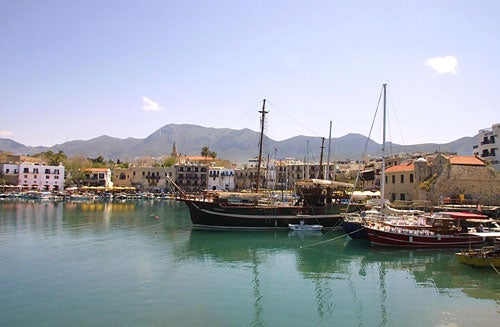Does Cyprus know where to draw the line?
The recent election of a president on a unification ticket could herald a new era of tourism for the island, says Sarah Barrell

Your support helps us to tell the story
This election is still a dead heat, according to most polls. In a fight with such wafer-thin margins, we need reporters on the ground talking to the people Trump and Harris are courting. Your support allows us to keep sending journalists to the story.
The Independent is trusted by 27 million Americans from across the entire political spectrum every month. Unlike many other quality news outlets, we choose not to lock you out of our reporting and analysis with paywalls. But quality journalism must still be paid for.
Help us keep bring these critical stories to light. Your support makes all the difference.
Since travel restrictions were eased in 2003, it has been possible to travel across the Green Line that slices Cyprus in two. A hop across this notorious border now involves no more than a stamp on a piece of paper, an act unimaginable for an entire generation of Cypriots who have lived in this divided society since 1974, when Turkey invaded the north in response to a Greek-backed military coup.
Yet, while crossing is easy, onward travel still has its practical problems. Will this all become easier following the election of Demetris Christofias as the President of Greek Cyprus on a ticket of ending the division?
International air authorities don't recognise Northern Cyprus's airport, so you can't fly direct, only via Turkey. Land crossing is the usual approach from Greek Cyprus into the Turkish north, but try this with a car and you run into insurance issues. Neither region recognises each other's car insurance.
I park my southern hire car in one of the long-stay lots that have sprung up like weeds along Nicosia's uniquely shaped Venetian walls since 2003. I pass on foot into the northern half of the capital, past neatly refurbished hammams and smart restaurants that are a sign of hopeful regeneration in the capital, to hire another, this time in Turkish lira.
Euros have been widely accepted in Greek Cyprus since January, when the state joined the euro following entry into the EU in 2004. This move has fuelled Turkey's EU aspirations: its membership is reliant on the island's reunified future among other factors. Certainly, on paper reunification looks more likely than ever, but images of the memorials to the conflict's dead erected around the border are a sharp reminder of how divisions still run deep. Kofi Annan's recent reunification plan was rejected by 76 per cent of Greek Cypriots and endorsed by 65 per cent of Turkish Cypriots.
But with the election of Christofias, Cyprus has become one of tourism's notable "watch this space" issues. Ending the division was the main campaign theme. South of the border, tourism is well established, while on the north side there is comparatively nothing. You are more likely to see a wild donkey on the beach than a deckchair.
But prospectors are quick to see that nothing as a big fat something. My drive through the hinterland reveals empty expanses of land partially tiled for farming, dotted with scant villages and modest white mosques. Closer to the coast, improbable-looking signs pop up in the dust advertising luxury villas and holiday villages – many of them British-run companies. Cyprus's British expat community has its historical roots in the island as a British territory and military post. Today, in the north at least, it's more associated with ex-cons. Many of these new developments are attributed anecdotally to these characters. However, Turkish authorities are handing over more of these less savoury British residents for extradition.
One wonders how they'd ever find them. Follow a Greek Cypriot road map in Turkish territory, or visa versa, and expect to be confounded by not only different names (in English, Greek and Turkish) but also conflicting road numbers. Add to this a number of new highways and service roads for new developments that don't show up on maps at all. Out towards the east coast things get easier as there is only one road, which comes to a sandy end halfway along the Karpas peninsula, a place with no electricity but plenty of rare turtles, plus a few huts-on-stilts beach accommodation that wouldn't look out of place in Thailand. While partition has bought economic obscurity to the north, it's this lack of attention that is protecting its wild landscapes.
Along the coast towards the tourist hub of Kyrenia, the north's rugged, deserted coastline becomes crowded with skeletal holiday villages that are quickly fleshing out. Kyrenia's old town, with the understated elegance of its Italianate harbour, is a rare find in Cyprus. The ownership of the hotels and bars here may be a sticky issue (the Greek Cyprus tourist office considers them "squatted"), but it's places such as Kyrenia, the wild Karpas peninsula and Cyprus's capital that will, on reunification, attract tourists after more than a bucket-and-space beach break.
Join our commenting forum
Join thought-provoking conversations, follow other Independent readers and see their replies
Comments